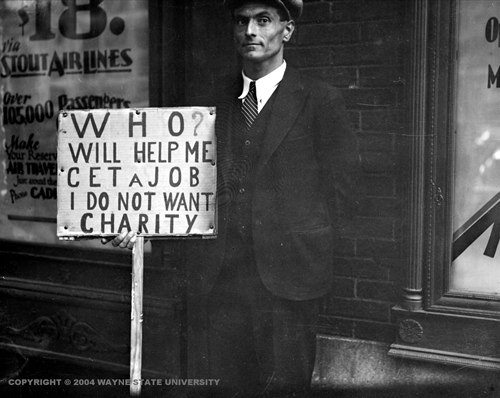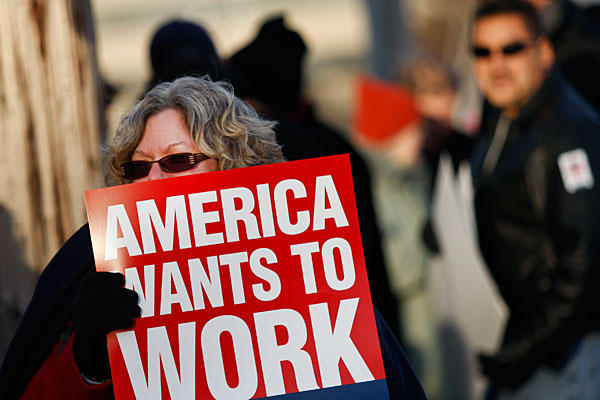
In case you missed my last few pieces, (here and here and here) I’m posting a new series as part of Ocean State Action Fund’s Where’s the Work? initiative that’s trying to bring coverage of the state’s unemployment crisis back to where it needs to be–on the real Rhode Islanders facing real hardship and pain as they continue to struggle for survival through our endless Great Recession.
In this post, Josie was brave enough to provide a quick glimpse into her uncompromising fight against unemployment.
Josie never could have imagined things would turn out like this when she came to Rhode Island in April of 2011 to live with her sister’s family in East Providence. Josie, who just turned 57, has been in the accounting field in New York City since the 1980s—her far-spanning resume includes working as a budget analyst for CBS. She left the apartment she’d lived in for 34 years in NYC and came to Rhode Island for an accounting job that she worked at for a total of 75 days, up until July 20th of last year, when she was laid off. On August 30th her sister told her she couldn’t stay with them anymore–they didn’t have the room or money–and since then she has been forced to move from couch to couch, depending on the good will of neighbors and members of her church.
The first thing Josie makes crystal clear is that there is nothing in this world she wants more than to return to the workforce. “I want to be able to work as long as my body and my mind allow me to work. There are people who told me to apply for disability—I got an injury a few years back. But I don’t want to be collecting a check that I’m not earning. I want to be able to work, to earn my way through. But it’s not happening.”
Josie is doing everything in her power to find a job. “I’ve looked in accounting, customer service, and the other fields I’ve worked in. I’ve applied to Stop & Shop, Dunkin’ Donuts, everything that I could possibly imagine. Most of the jobs come through agencies, so I’m registered with all of them. Six days a week I’m at Network RI [a state unemployment resource center] or the library, sending out resumes and searching the web. Monster, CareerBuilder, Craigslist, LinkedIn, anywhere that’s out there that you can look for a job, I’m looking. Every morning I’m here—I don’t wait till the afternoon. Five to six hours each day, every day. I’m computer literate, doesn’t take long for me to pick up any of these new programs. I’m physically fit, mentally fit, willing to work as hard as I possibly can.” She looks down, shrugs. “I’m just trying to figure out what’s the problem.”
Josie is not receiving unemployment benefits, either. “I have no income whatsoever,” she says. “I managed to get some SNAP benefits, but that’s it. I’m just here by the grace of God.” Despite how difficult her situation is, she continues to volunteer in the community, doing volunteer tax preparation work as well as utilizing her catering experience at a weekly soup kitchen at her church. “I continue to go to church, to stay in the right frame of mind. And I just have to pray that the Lord’s gonna open a door for me.”
“Here I am, serving the homeless, and that’s what I am.” Suddenly, tears come into her eyes. It seems hard for her to believe she could have fallen into such rough times. In a few days, Josie will be checking into a homeless shelter herself.
“We’re supposed to be living in a democratic society,” she says, “but we don’t help our own. Do people actually care about you here? In Sweden, I hear, they help you, you have guaranteed healthcare. I don’t even have Medicaid.”
“I’m lost right now,” she continues, “and I’m just trying to find my way.” Josie throws up her hands. “I don’t understand it. What do they expect people to do out here? The system is pushing you into poverty. It’s pushing you way down to the bottom. If you lose your job, if you don’t have savings, you’re going straight to a shelter or on the street. It’s just not right.”





 In Rhode Island, we talk a lot about unemployment. We talk about the numbers and the rates, we talk about our awful state ranking. But what is often missing from the conversation are the voices of the actual Rhode Islanders who are going through this crisis, who are struggling each and every day to find work, who are worrying more and more about how they’re going to pay the bills or keep their homes.
In Rhode Island, we talk a lot about unemployment. We talk about the numbers and the rates, we talk about our awful state ranking. But what is often missing from the conversation are the voices of the actual Rhode Islanders who are going through this crisis, who are struggling each and every day to find work, who are worrying more and more about how they’re going to pay the bills or keep their homes.




